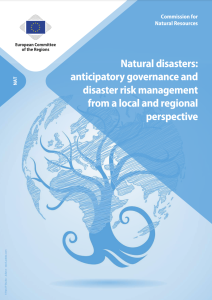 Homepage CASE
Homepage CASE
Selected values

Natural disasters: anticipatory governance and disaster risk management from a local and regional perspective
-

Karolina Zubel
Environment, Energy and Climate Change Director
Karolina Zubel holds an MSc from the London School of Economics and Political Science and BA from the University of Warsaw and Sciences Po Paris. Currently, she is a PhD student at the Warsaw School of Economics, focusing her research endeavours on smart cities developments. Her work has been at the intersection of sustainability, low-carbon … <a href="https://case.dev10.pro/publications/natural-disasters-anticipatory-governance-and-disaster-risk-management-from-a-local-and-regional-perspective/">Continued</a>
Articles from this author:
-
Affordable Sustainable Housing in the EU
The study commissioned by the European Economic and Social Committee, examines strategies to address the pressing challenges of housing affordability and sustainability across the EU. It focuses on two key areas: the role of digitalization in the housing sector and the contribution of social economy initiatives. Key findings include: Digitalization's Role: The study highlights how tools like Building Information Modelling (BIM) and AI can streamline planning, improve energy efficiency, and enhance building management. Case studies from Denmark, France, and the Netherlands illustrate successful digital solutions. Social Economy Contributions: Localized, community-oriented housing solutions, like cooperatives and social rental agencies, demonstrate the value of non-profit initiatives in creating affordable, resilient, and sustainable living environments. Examples include projects in Austria, Poland, and Spain. Policy Recommendations: Medium-term goals (by 2030) include harmonizing EU-wide housing policies and integrating digital platforms. Long-term strategies (by 2050) emphasize developing inclusive housing models and leveraging digital innovations. The study concludes that addressing housing issues requires a holistic approach, combining economic, environmental, and social strategies while fostering cooperation among local, national, and EU stakeholders.
-
The means for cities and regions to support the energy transition in the Mediterranean
The Mediterranean region is warming 20% faster than the global average, and population growth, tourism, and industrialisation are increasing pressure on its energy resources, which remain heavily reliant on fossil fuels. Despite vast renewable energy potential, Southern and Eastern Mediterranean countries use only a small share of RES. Decarbonisation is essential to addressing the climate crisis and promoting sustainable growth. Local and regional authorities (LRAs) are key to accelerating an inclusive energy transition. Recommended actions include: - Developing tailored energy transition plans aligned with national and international goals. - Investing in capacity-building and training for local energy management. - Expanding beyond solar energy to include wind, bioenergy, and offshore renewables. - Collaborating across networks to share expertise and promote decentralised solutions. - Engaging communities through awareness campaigns and participatory decision-making. - Offering incentives to attract private investment and streamline processes. - Fostering international cooperation to share resources and innovation. By empowering local actors and promoting collaboration, the Mediterranean can lead a just and sustainable energy transition.
- The contribution of the Mediterranean cities and regions to building water resilience
-
Affordable Sustainable Housing in the EU
-

Agnieszka Maj
Economist
Agnieszka Maj is an Economist at CASE. She holds an MA degree in International Economic Relations from Cracow University of Economics. Currently, she is obtaining an MA in Gender Studies – Intersectionality and Change at Linköping University. During her education (on both BA and MA levels) she participated in numerous exchange programs at the University … <a href="https://case.dev10.pro/publications/natural-disasters-anticipatory-governance-and-disaster-risk-management-from-a-local-and-regional-perspective/">Continued</a>
Articles from this author:
-
Blueprint and Methodology for Innovative Governance
The publication is a key deliverable within the BioBeo project, funded under the Horizon Europe program. It provides a structured approach to integrating bioeconomy education into school curricula across different institutional and social environments. The report examines the actors involved in curriculum decision-making, from policymakers and school administrators to parents, students, and businesses. It categorizes existing procedures for introducing new content into schools, whether initiated by teachers, school heads, or government authorities. Key barriers—legal, organizational, and socio-cultural—are identified, along with strategies to overcome them. A central theme is the importance of inclusive governance in education, advocating for participatory decision-making that involves various stakeholders. Recommendations highlight the need for flexibility in curriculum design, adequate funding, professional support for teachers, and depoliticization of educational content. The report concludes by situating these findings within the broader BioBeo curriculum framework, reinforcing the role of education in fostering a sustainable and circular bioeconomy.
-
Affordable Sustainable Housing in the EU
The study commissioned by the European Economic and Social Committee, examines strategies to address the pressing challenges of housing affordability and sustainability across the EU. It focuses on two key areas: the role of digitalization in the housing sector and the contribution of social economy initiatives. Key findings include: Digitalization's Role: The study highlights how tools like Building Information Modelling (BIM) and AI can streamline planning, improve energy efficiency, and enhance building management. Case studies from Denmark, France, and the Netherlands illustrate successful digital solutions. Social Economy Contributions: Localized, community-oriented housing solutions, like cooperatives and social rental agencies, demonstrate the value of non-profit initiatives in creating affordable, resilient, and sustainable living environments. Examples include projects in Austria, Poland, and Spain. Policy Recommendations: Medium-term goals (by 2030) include harmonizing EU-wide housing policies and integrating digital platforms. Long-term strategies (by 2050) emphasize developing inclusive housing models and leveraging digital innovations. The study concludes that addressing housing issues requires a holistic approach, combining economic, environmental, and social strategies while fostering cooperation among local, national, and EU stakeholders.
- How to eradicate skills poverty among the most vulnerable?
-
Blueprint and Methodology for Innovative Governance
Related publications
Thanks for joining us!
You're now part of a community that values [your newsletter's focus]. Get ready to stay informed, inspired, and engaged with our carefully curated content.
